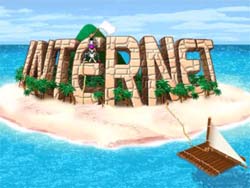Hardly switch to IPv6 Internet
Switching to using the new generation Internet is no less difficult than trying to change the engine while the plane is still . flying.
Very difficult
Network devices and routers need to be replaced, personal computers need to be taken to stores to upgrade the software.
But most problematic, we can't turn off the entire network for a while to maintain or upgrade, as millions of companies, organizations and individuals are relying on the Internet every day.
And take a moment to think about the funding for this project - it could reach billions of dollars.
More than anyone, supporters of a new, "pure and clean" Internet understand very well these barriers and difficulties, although the security and mobile prospects are superior to the network. The current.
Twin carriage code?
 Source: Inca In fact, the foundation of IPv6 system has almost been completed since 10 years ago, but the majority of hardware and software are still using old IPv4 technology.
Source: Inca In fact, the foundation of IPv6 system has almost been completed since 10 years ago, but the majority of hardware and software are still using old IPv4 technology.
The biggest question now is " How to deploy it? Is there a revolutionary roadmap? " Stanford University professor Andrea Goldsmith said.
A proposed solution is to open a parallel network, exclusively for real applications that need new Internet. Users will gradually switch to the new system, much like how many people are abandoning their fixed phones to run with VoIP, although both systems are in parallel.
A whole process
" The transition will take place in a process. Some services will take off and attract users. Businesses will also pay attention and apply, " said Larry Peterson, Chairman of Computer Science. Princeton University stated.
In addition, to save costs, businesses should buy network devices that can work on both old and new Internet platforms.
Some believe that Internet Protocol 4 will never be wiped out, and that the "sweet fruit" of current research on IPv6 will only be used to improve the current infrastructure structure, instead of burying or dumping. it.
" You cannot reform the network of the whole world easily, especially when a few billion people are intimately attached to it, " said Professor Leonard Kleinrock.
Trong Cam
Very difficult
Network devices and routers need to be replaced, personal computers need to be taken to stores to upgrade the software.
But most problematic, we can't turn off the entire network for a while to maintain or upgrade, as millions of companies, organizations and individuals are relying on the Internet every day.
And take a moment to think about the funding for this project - it could reach billions of dollars.
More than anyone, supporters of a new, "pure and clean" Internet understand very well these barriers and difficulties, although the security and mobile prospects are superior to the network. The current.
Twin carriage code?
 Source: Inca In fact, the foundation of IPv6 system has almost been completed since 10 years ago, but the majority of hardware and software are still using old IPv4 technology.
Source: Inca In fact, the foundation of IPv6 system has almost been completed since 10 years ago, but the majority of hardware and software are still using old IPv4 technology. The biggest question now is " How to deploy it? Is there a revolutionary roadmap? " Stanford University professor Andrea Goldsmith said.
A proposed solution is to open a parallel network, exclusively for real applications that need new Internet. Users will gradually switch to the new system, much like how many people are abandoning their fixed phones to run with VoIP, although both systems are in parallel.
A whole process
" The transition will take place in a process. Some services will take off and attract users. Businesses will also pay attention and apply, " said Larry Peterson, Chairman of Computer Science. Princeton University stated.
In addition, to save costs, businesses should buy network devices that can work on both old and new Internet platforms.
Some believe that Internet Protocol 4 will never be wiped out, and that the "sweet fruit" of current research on IPv6 will only be used to improve the current infrastructure structure, instead of burying or dumping. it.
" You cannot reform the network of the whole world easily, especially when a few billion people are intimately attached to it, " said Professor Leonard Kleinrock.
Trong Cam
5 ★ | 1 Vote
You should read it
- How to fix when losing Internet connection
- Does a VPN slow down your Internet connection?
- What is Starlink? How does satellite internet work?
- 5 things to do when ... lose the Internet
- Speed up Internet connection by using CMD command on WindowsXP / 7/8 / 8.1
- How to check Internet speed with cmd command
 Wifi = does not mean anything?
Wifi = does not mean anything? Basic knowledge to set up a home wireless network
Basic knowledge to set up a home wireless network Create solutions for SharePoint 2007
Create solutions for SharePoint 2007 Efficiently exploit printers in Windows Server 2003 (Part 2)
Efficiently exploit printers in Windows Server 2003 (Part 2) Introduction to Network Access Protection (Part 6)
Introduction to Network Access Protection (Part 6) Learn about the ISA Firewall Client (Part 1)
Learn about the ISA Firewall Client (Part 1)